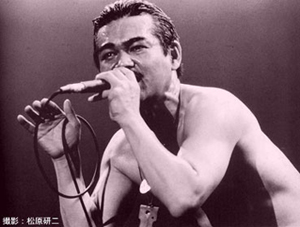
As I work on synergizing my blog writing with the long-term goals for my book, there's one project in particular I think I can process in sufficiently tiny chunks - the survey of the variety of acts that laid the groundwork in music for the emergence of hip hop. It's a long history - urban Japan was consuming Jazz en mass as early as the 1920s, and there are reports (which I'll be working to substantiate) that Admiral Perry brought a troupe of blackface minstrels with his port-opening Black Ships (an association that I don't want to forget).
But a more immediate cause was the string of funk, reggae and soul bands stretching from the 1960s to the 1980s, introducing 'black music' in a more explicit, and often more politicized, form than had been the case back in the 1920s (and translating - literally - the extreme politicization of funk and jazz during the AMPO protests of the 1960s.
One of the most important immediate inspirations for the direction taken by Japanese hip hop - specifically, the politicized hip hop underground - was the band Jagatara. In fact, right now I'm watching the documentary/concert film Jagatara - この~!!(もうがまんできない)[We Can't Take It Anymore!]. The band, and particularly leader Edo Akemi, are recurring cult figures in Japanese hip hop. Jinno Toshifumi made the band the focus of a huge tome, and Akemi gets a shout out at the beginning of ECD's seminal album Big Youth, stacked up with Malcolm X, Bob Marley, and other luminaries of rebellion for justice. I've heard a couple of their
A live recording will almost always correct any problems of slickness, and this one is particularly grimy, since the first segment was recorded in 1989 on equipment that was not particularly sterling even for the era. But the other misperception it's helping me correct is one of genre - I've faulted Jagatara for being a too-slick funk band, but what they really were was a reggae band, with a heavy debt to hard rock.
Here's a taste of what they're like (with more videos available if you click through):
But the reason this guy could transcend genres to live on as a symbol for later artists is pretty clear. In an interview segment in the middle of this video, recorded sometime in the 1980s (he died in 1990), he calls the 1980s a "failure," a stance that would have made him the definition of an iconoclast at the time. He predicts that in the 1990s, music is going to get wider, brighter, and more open to "world music," which kind of turned out to be true (reggae and hip hop only kept getting bigger) and sort of didn't (if anything, lame idols and J-pop became even more dominant in the 1990s before R & B came on in the 2000s).
Following the interview, there's a really electric performance of a hard dub/reggae song with Mute Beat (another candidate for prehistorical importance). What comes across in all these performances is a great deal of passion, and Akemi knows perfectly well that's what he's got to offer - as he says in the interstitial interview, it's easy enough to understand where Jagatara are coming from in terms of genre. What's not so easy to understand, and what most other Japanese bands at the time couldn't capture, was their expressive energy.
No comments:
Post a Comment